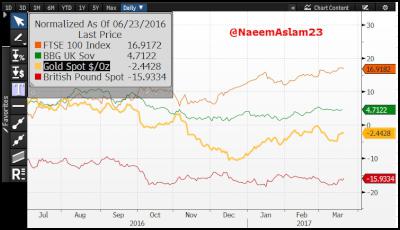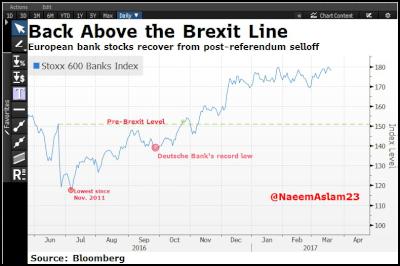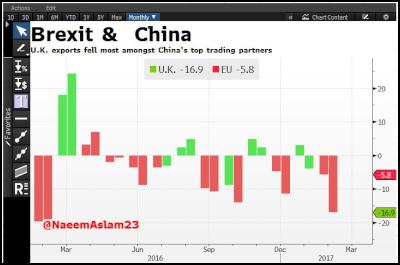How To Trade 29th March When Theresa May Triggers Brexit
It is all about trading the event and timing is very
important when it comes to it. The 29th of March is the day
when the British Prime Minister, Theresa May will invoke the
Article 50 and the UK will be entered in divorce
negotiations of leaving the European Union. It may appear
that the date is still far, but it is important as an
investor that you are prepared for it. It is of vital
importance that you know which markets and asset classes
could see the potential impact on this event on that
specific date.
I have always said, so far we have
only seen a trailer of the Brexit film and the actual film
will only be in cinemas after the Article 50 is triggered.
It is only then, that we will start to see the concussions
on the UK’s economy, consumer health, consumer confidence,
housing market and the UK’s job market. There is no doubt
that all these areas have performed relatively well. But,
now it is time to get ready and brace real changes which are
going to hit the economy.
The essential element is
to know your risk profile before you jump into trading this
upcoming event. You need to ask yourself a question; are you
a passive investor – a trader who likes to wait for the
trend to be established first and then trade it? OR are you
an active investor, a trader who likes to get in first
before the trade becomes crowdy?
Nonetheless, there
are four asset classes which could see the potential impact
of Theresa May’s action on the 29th of
March
· Currency
-Sterling
· Equity Market -FTSE
100
· Fixed Income- The UK’s Guilt
market
· Precious Metal –
Gold

Source:
Bloomberg
Since the Brexit vote, it has been very
clear that any weakness in the currency has pushed the
equity market higher. The fixed income market- the UK
Guilts, has been very much dependent on the actions of the
Bank of England. Inflation in the UK has accelerated far
more than many economists have predicted. For the first time
in three-year, the inflation data released for the month
of February has confirmed that the BOE’s inflation target
has been breached. Higher inflation is keeping a constant
pressure on the BOE and the bank needs to increase their
ultra-low-interest-rate to combat this. However, the BOE has
fought back and maintained its position that they can
increase or decrease the interest rate.
So far the
bank has been very accommodating to Brexit woes. After the
29th of March, the bank may have to do more if the economy
slows more than their forecast. The bank can lower their
interest rate or increase the asset purchase programme and
that could potentially push the sterling lower. In the fixed
income market, it means the yields could move lower on the
UK gilts.
As for the equity market, the UK FTSE,
the current relationship with sterling could change. The
firms will be under pressure of higher input costs, but at
the same time, they may be reluctant to pass those higher
prices to consumers. Therefore, the balance sheets of these
firms could have damaging shocks which could pull the FTSE
100 lower.
Within the FTSE 100, the sector which
gained the most amount of attention at the time of Brexit
vote was the European banking sector, particularly, the
UK’s bank. The below chart clearly shows that how
investors sold the sector on the back of Brexit referendum
outcome news. Although, we have popped back up and have made
new highs, but a number of investment firms and banks
leaving the UK could only have a negative impact for the
FTSE. The passporting right for investment firm is one of
the biggest challenges for Theresa May which she will have
to fight.

China, the world’s
second biggest economy of the world, is a very important
trading partner for the UK. The UK’s export has fallen the
most among China’s top trading partner and this is going
to make a detrimental impact on the UK’s GDP.

Finally, the
risk-adverse mode is clearly seen when the precious metal
starts to rise. It is highly possible that we may not see
that much of an impact on the 29th of March, but the
consequences of Brexit and negotiation process is going to
create enough headlines which is going to make investors
very
anxious.


 Nicola Gaston, The Conversation: NZ Budget 2025 - Science Investment Must Increase As A Proportion Of GDP For NZ To Innovate And Compete
Nicola Gaston, The Conversation: NZ Budget 2025 - Science Investment Must Increase As A Proportion Of GDP For NZ To Innovate And Compete Maritime Union of New Zealand: Maritime Union Condemns Threatened Job Losses On Aratere Ferry
Maritime Union of New Zealand: Maritime Union Condemns Threatened Job Losses On Aratere Ferry Science Media Centre: Proposed Increase To Glyphosate Limits – Expert Reaction
Science Media Centre: Proposed Increase To Glyphosate Limits – Expert Reaction Electricity Authority: Welcomes Plan For Boosting Consumer-Supplied Flexibility
Electricity Authority: Welcomes Plan For Boosting Consumer-Supplied Flexibility University of Auckland: How Can Finance Be Harnessed For Good?
University of Auckland: How Can Finance Be Harnessed For Good? Michael Ryan, The Conversation: NZ Budget 2025 - Economic Forecasting Is Notoriously Difficult, But Global Uncertainty Is Making It Harder
Michael Ryan, The Conversation: NZ Budget 2025 - Economic Forecasting Is Notoriously Difficult, But Global Uncertainty Is Making It Harder


